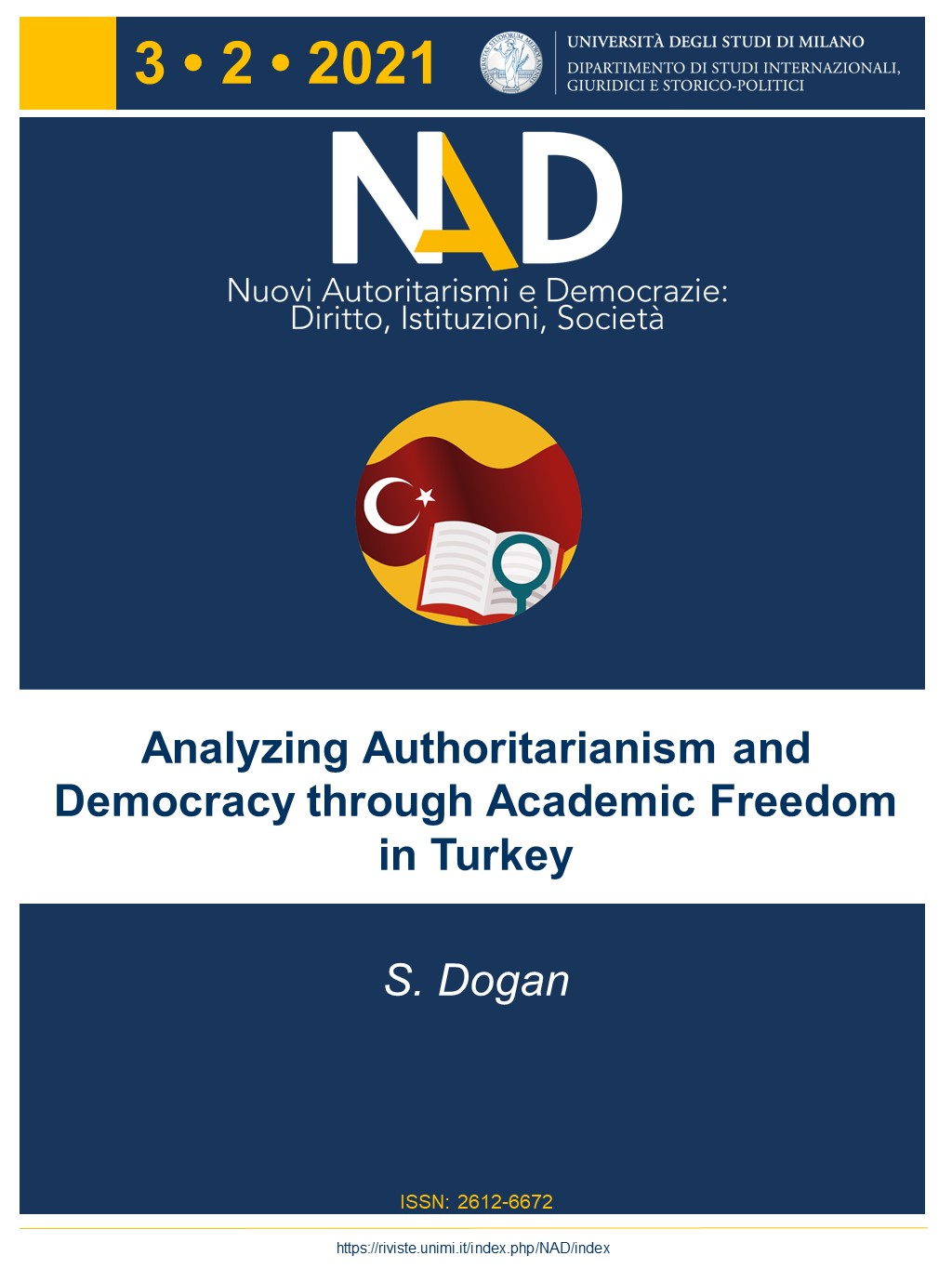Analyzing authoritarianism and democracy through academic freedom in Turkey
DOI:
https://doi.org/10.13130/2612-6672/16921Keywords:
Academic Freedom, Authoritarianism, Turkey, AKP, GramsciAbstract
The article examines the concepts of authoritarianism and democracy in Turkey through an analysis of academic freedom. From its foundation, Turkish democracy has suffered from being hybrid, i.e., a combination of democratic and authoritarian elements. Since 2016, after the attempted coup d’état, Turkish parliamentarianism has been transformed into a one-man regime. This contribution analyses the new type of Turkish authoritarianism from its foundation, since the rise of Justice and Development Party (AKP), using the Gramscian concept of hegemony and the role of the intellectual. Then, the article presents an interview with a scholar still working in a Turkish university to better understand the state of academic freedom in Turkey.
References
F. Başkaya, Paradigmanın İflası: Resmi İdeolojinin Eleştirisine Giriş, Yordam Kitap, 2006, 14.
A. Kaya, The Inclusion-Moderation Thesis: Turkey's AKP, From Conservative Democracy to Conservatism, in Oxford Research Encyclopedia of Politics, Oxford University Press, 2019.
C. Tugal, Passive Revolution: Absorbing the Islamic Challenge to Capitalism, Stanford University Press, 2009; M. Yaman, Intellectual Hegemony of Justice and Development Party in Turkey: A Gramscian Perspective, Master thesis, METU, 2012.
B. Yarar, Reflecting on The Oppositional Discourses Against the AKP’s Neoliberalism and Searching for a New Vision for Feminist Counter Politics, in Les Cahiers du Cedref: Transformation of Gender regime in Turkey, no. 22, 2018, journals.openedition.org/cedref/1101.
F. K. Akkoyunlu, The rise and fall of the hybrid regime: guardianship and democracy in Iran and Turkey, PhD thesis, London School of Economics and Political Science, 2014;
B. Öney, M. M. Ardag, The relationship between diffuse support for democracy and governing party support in a hybrid regime: evidence with four representative samples from Turkey, in Turkish Studies, 2021;
K. Kippels, Is Turkey becoming a hybrid regime?, in RTE, 26 November 2019, rte.ie/brainstorm/2019/1121/1094341-is-turkey-becoming-a-hybrid-regime.
A. Gramsci, Selections from the prison notebooks (hereafter SPN), in Q. Hoare, G. Nowell-Smith (Eds.), Lawrence-Wishart, 1992, 221; A. Gramsci, Quaderni dal Carcere (hereafter QC, paragraph §), in V. Gerratana (Ed.), Vol. 1, Einaudi, 1977.
A. Gramsci, SPN, cit., 80.
B. Fontana, Caesarism and Bonapartism, cit., 184.
A. Gramsci, SPN, cit. 12,
Q. Hoare, G. Nowell-Smith (Eds.), Introduction to the Intellectuals, in A. Gramsci, Selections from the prison notebooks, Lawrence-Wishart, 1992.
A. Gramsci, Quaderni dal Carcere, V. Gerratana (Ed.), Einaudi, Vol. 3, 1977, 2010.
B. Fontana’s article: The Concept of Caesarism in Gramsci, in P. Baehr, M. Richter (Eds.), Dictatorship in History and Theory: Bonapartism, Caesarism, and Totalitarianism, Cambridge University Press, 2004, 183.
S. Doğan, E. Selenica, Authoritarianism and academic freedom in neoliberal Turkey, in Globalisation, Societies and Education, 2021.
A. Vatansever, At the Margins of Academia: Exile, Precariousness, and Subjectivity, Brill, 2020; U. Özkirimli, How to Liquidate a People? Academic Freedom in Turkey and Beyond, in Globalizations, No. 6, 2017; T. Abbas, A. Zalta, ‘You cannot talk about academic freedom in such an oppressive environment’: perceptions of the We Will Not Be a Party to This Crime! petition signatories, in Turkish Studies, No. 4, 2017.
W. J. Booth, On the Idea of Time in Marx's Political Economy, in Political Theory, No. 1, 1991, 7.
K. Marx, Grundrisse (1857/58), M. Nicolaus (Trans.), Vintage Books, 1973, 172, 711.

Downloads
Published
How to Cite
Issue
Section
License
Copyright (c) 2021 Sevgi Dogan

This work is licensed under a Creative Commons Attribution-NonCommercial-NoDerivatives 4.0 International License.









